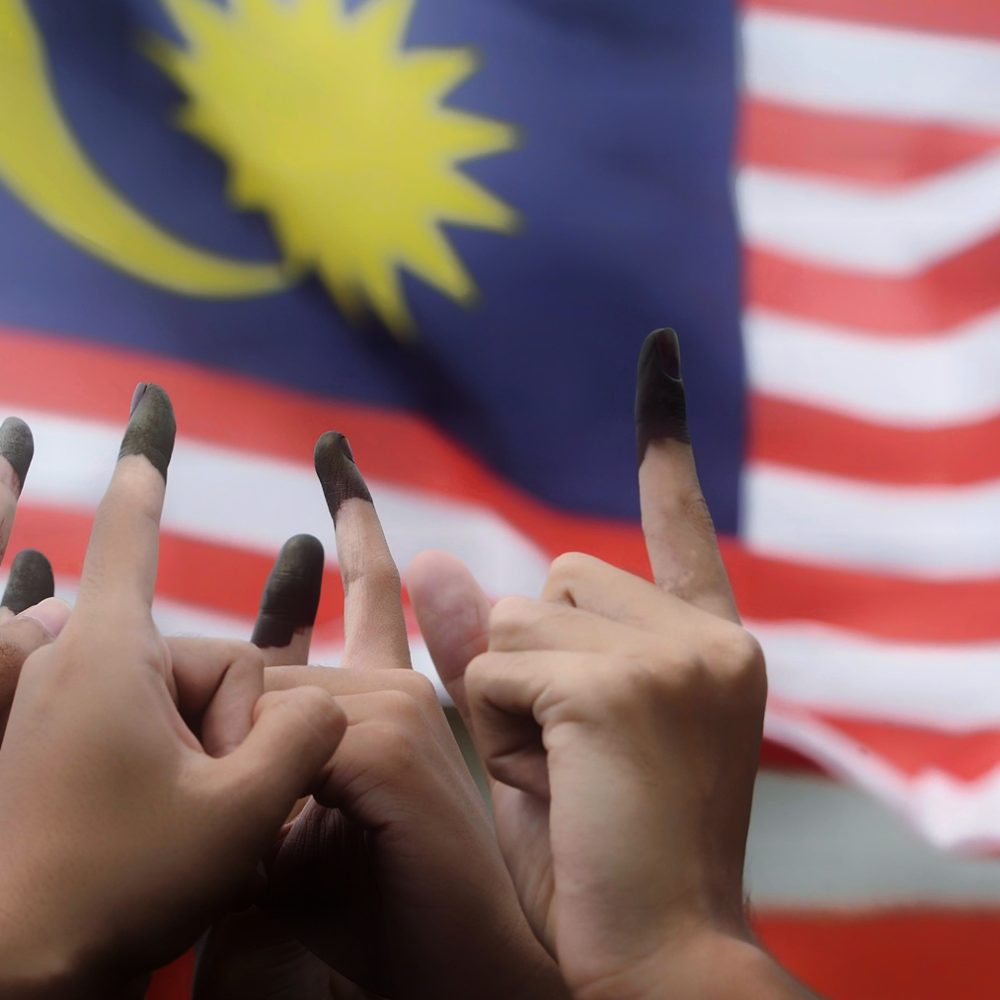

Malaysia State Election 2023: Prospects for the “Unity Government”
Muhamad Takiyuddin Ismail
(Associate Professor in the Political Science Program, Universiti Kebangsaan Malaysia)
October 6, 2023
Background
Malaysia has once again held a round of elections, nine months after the 15th Malaysian General Election 2022 (GE15), which led to the formation of the “unity government” led by Anwar Ibrahim. These six state elections were held by those states that refrained from holding elections concurrently with GE15. Selangor, Penang, and Negeri Sembilan are governed by the Pakatan Harapan-Barisan Nasional (PH-BN) coalition, while Kedah, Kelantan, and Terengganu (the Malay belt) are ruled by the Perikatan Nasional (PN) coalition comprising Islamic parties, Parti Islam Se-Malaysia (PAS), and Bersatu (an extension of the United Malays National Organization (UMNO) party).
Generally, the Malaysian State Election (MSE) 2023 is considered a referendum against Anwar Ibrahim’s unity government, which was formed by politically aligning with BN, the UMNO-led opposition party. Notably, UMNO’s abandonment of the “No Anwar, No DAP (Democratic Action Party)” principle post-GE15 evoked cynicism among political observers and their supporters. As a quid pro quo, Anwar resorted to appointing Zahid Hamidi, the UMNO President and his former “protégé,” as Deputy Prime Minister. This appointment was poorly received by PH supporters, as Zahid had 47 pending corruption cases at the time, and undermined the legitimacy of the anti-corruption agenda, which is the hallmark of Anwar’s administration. The tenth Prime Minister is encountering significant challenges in garnering the Malay community’s support via Malaysia Madani, a more inclusive and progressive social concept. A poll prior to MSE 2023 revealed that only one in four Malays was satisfied with Anwar’s leadership.
MSE 2023 Results at a Glance
Despite refutation by the PH-BN coalition on PN claims that the MSE 2023 outcome would affect the central government’s stability, these claims have inevitably influenced PN supporters and voters. The PN attained moral victory with an increase in the number of seats, which has made significant inroads in the three PH-BN–controlled states. Nevertheless, the final MSE 2023 outcome maintained the status quo. The table below compares the seat acquisition in all six states during GE14 2018 and MSE 2023.
Table 1 Seat Acquisition in the Six States during GE14 2018 and MSE 2023
| States | 14thGE 2018 | MSE 2023 |
|---|---|---|
| PH-BN–Controlled States* | ||
| Selangor | 55/56 | 34/56 |
| Penang | 35/40 | 29/40 |
| Negeri Sembilan | 36/36 | 31/36 |
| PN-Controlled States | ||
| Kelantan | 37/45 | 43/45 |
| Terengganu | 22/32 | 32/32 |
| Kedah | 23/36** | 33/36 |
*Total seats taking into account the PH-BN coalition post-GE15.
**Total seats taking into account the political alignment in Kedah, which occurred in 2020.
Source: Created by the author.
Selangor, which lost its two-thirds majority, was the worst affected state. Despite winning a two-thirds majority in Penang and Negeri Sembilan, the PH-BN alliance lost six and five seats to the PN, respectively. All the PN-controlled areas generally comprise Malay voters. For example, three seats in Permatang Pauh, an area traditionally held by Anwar’s family, fell to the PN in GE15.
Kelantan, Terengganu, and Kedah, the three states in the Malay belt, disclosed a more discouraging outcome for the PH-BN coalition. As the pillars of PAS on the East Coast of Peninsula Malaysia, Kelantan and Terengganu did not yield to PH-BN efforts to establish a political presence in the states. Despite being heavily criticized by PH-BN for the Kelantan state government’s failure to distribute clean water, this criticism would appear to have provoked a backlash. The PAS went on to win 43 of the 45 seats contested. The neighboring state of Terengganu made history by winning all the 32 seats contested and overthrowing the opposition.
Notwithstanding, the state of Kedah garnered much attention when PAS managed to lead the state via a political alignment in 2020. This alliance left PH-BN with only three seats. Undeniably, PAS in Kedah owes its victory to the charisma of its Chief Minister, Sanusi Mohd Noor. As a predominant political figure in the PAS leadership, Sanusi (commonly called the “Malaysian Trump” by critics) is a formidable force in the PN campaign. Many PN voters from the younger generation were attracted to the politician’s “natural” character and “warrior-like” persona.
What Went Wrong for PH-BN?
The “Green Wave,” a term coined by observers and analysts to portray the influence and sudden victory of PN in GE15, has not yet subsided. The conservative coalition managed to woo Malay voters while simultaneously influencing PH supporters to shift their vote. Despite Anwar’s effort to portray himself as a leader for all Malaysians, Malay solidarity and religious appeal seem to exert more influence. Even the corruption charges faced by Bersatu leaders, including Muhyiddin Yassin (former Prime Minister), failed to alter the Malay voter pattern. Muhyiddin was acquitted of the charges two days following the MSE 2023 results. From analysts’ perspective, the situation would have worsened for PH-BN if these acquittals had been announced before the polling day.
As UMNO only won 19 of the 108 seats contested in MSE 2023, Anwar does not seem to benefit from the party’s presence in obtaining Malay votes. Zahid Hamidi managed to resist the call to resign as the UMNO President post-GE15. In January 2023, the UMNO General Assembly passed a resolution of no contest for two top posts rather than taking a reality check. The party also performed an internal purge by removing several senior leaders who were deemed pro-Bersatu. At this point, Zahid still refused to resign despite growing discontent at the grassroots level.
Meanwhile, the UMNO-DAP collaboration facilitated the PN campaign. Some UMNO leaders’ apologetic attitudes towards DAP following their merger angered the grassroots, who accused the party of deviating from the Malay-Islam cause. Many UMNO voters protested by choosing not to vote or casting their vote for PN. The PH-BN may lose more seats if the voter turnout exceeds 80% compared to the average of 70%. In fact, some PH leaders regretted not holding state elections simultaneously with GE15.
The PH-BN’s mission to curb PN’s progress by exerting its influence as the ruling government is considered overkill. Similar to what was practiced by BN in the past, PH-BN strived to convince voters with economic and development incentives, such as salary increments for civil servants. Nevertheless, preliminary estimates and field sources claimed that civil servants encompassing the police, army, and teachers, most of whom are Malays-Muslims, voted for PN. Anwar was also heavily criticized for using government helicopters for campaigning and making an arrogant remark to defend his purpose.
The blocking of several news portals and individual websites alongside threats of legal action highlight PH’s tendency to use coercion to quell criticism. Such acts have caused PH to be viewed negatively by the opposition and civil society activists. The verbal attack on Sanusi Md Noor, Chief Minister of Kedah, up until the eve of the voting day exemplifies a classic case of overkill. Most of the PH-BN leaders, including Anwar, made Kedah an important stopover location during the campaign. In the middle of campaign, Sanusi was arrested by the police at 3:00 a.m. due to his campaign speech. His arrest at that untimely hour was heavily criticized and garnered much sympathy for PN. Furthermore, the use of the Sedition Act to prosecute Sanusi contradicted PH’s stance on not using the archaic law.
The PH-BN’s excessive attack on Kelantan regarding the water distribution issue caused a boomerang effect. The voters in Kelantan, most of whom worked in more developed states (Selangor and Kuala Lumpur), were insulted by the insinuations made by PH-BN supporters, such as “Kelantanese will be able to drink cappuccino every day if they continue to maintain PAS.” Unsurprisingly, the PH-BN appeal for the “anak-anak perantauan (people who earn their living in other states)” to return home and cast their vote for the new state government was not well-received. An inadequate understanding of the more parochial Kelantan psyche and political culture renders the PH-BN campaign ineffective.
Quo Vadis Anwar and Unity Government
The two key parties, PAS and DAP (which won 46 out of the 47 seats contested) characterize the widening voting polarity between Malay Muslims (PAS) and the Chinese (DAP). This chasm indicates the lack of a middle spectrum, which was previously represented by BN-UMNO. Malays who no longer perceive UMNO as a “psychological protector” post-GE14 in 2018 have sought an “alternative protector” in GE15 and MSE 2023 – such as PN.
Questions on whether the Anwar-led government would become more conservative to appease Malay voters remain to be answered. The government had previously banned the sales of Swatch watches, which symbolize LGBT. Two weeks after MSE 2023, the government was also criticized by various non-Muslim quarters for the introduction of a hadith module in schools (although not compulsory for non-Muslim students). As a Prime Minister who relies on reformist credentials, Anwar’s attempts to continue implementing institutional and structural reforms in line with civil society organizations may not come to fruition considering backlash from Malay voters.
Anwar has been constantly asked to act as befits a Prime Minister rather than a leader of the opposition. For example, Anwar’s speech to students in several universities at the start of the campaign was called “highly political” and “self-serving.” In the nine months of his leadership much emphasis has been placed on “image building,” such as the poorly received biopic film on Anwar’s life, rather than comprehensive economic recovery.
For now, Anwar’s government is safe and has a strong majority. The enforcement of the Anti-Hopping Act has made new political realignment not possible. Likewise, rumors regarding the resignation of some members of the government’s Parliament are rife. Theoretically, PN would not succeed in taking over the federal government without non-Malay voters’ support and cooperation. Nevertheless, Anwar and the unity government must successfully perform a political balancing act and exercise moral authority to steer Malaysia in the next four years before GE16.
Muhamad Takiyuddin Ismail (Ph.D.) is Associate Professor in the Political Science Program at Universiti Kebangsaan Malaysia. His research interests include democratization, political thought, and popular culture. His work appears in numerous journals such as Pacific Review, Pacific Affairs, Asian Survey, Asian Journal of Political Science, Taiwan Journal of Democracy, and Kajian Malaysia. He is a recipient of the 2018 Japan Foundation Fellowship Program.
